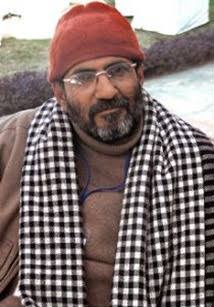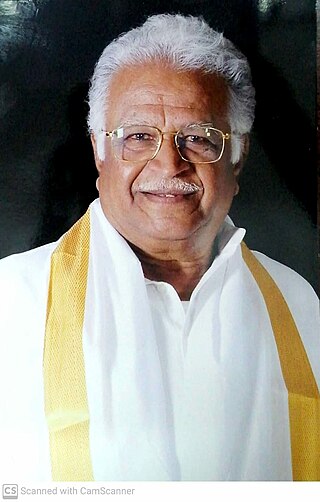Rohinton Mistry is an Indian-born Canadian writer. He has been the recipient of many awards including the Neustadt International Prize for Literature in 2012. Each of his first three novels was shortlisted for the Booker Prize. His novels to date have been set in India, told from the perspective of Parsis, and explore themes of family life, poverty, discrimination, and the corrupting influence of society.

Pallonji Shapoorji Mistry was an Indian-born Irish billionaire businessman. He was chairman of the Shapoorji Pallonji Group and a major shareholder of India's largest private conglomerate, Tata Group.

N. S. Madhavan is an Indian writer of Malayalam literature. Known for his novel, Lanthan Batheriyile Luthiniyakal and a host of short stories such as Higuita, Thiruthu, Chulaimedile Shavangal and Vanmarangal Veezhumpol, Madhavan also writes football columns and travel articles. He is a distinguished fellow of Kerala Sahitya Akademi and a recipient of several major awards including Odakkuzhal Award, Kerala Sahitya Akademi Award for Story, Kerala Sahitya Akademi Award for Novel, Muttathu Varkey Award, Mathrubhumi Literary Award, Crossword Book Award and Kerala State Students Federation Sahithyolsav Award.

Qurratulain Hyder was an Indian Urdu novelist and short story writer, academic, and journalist. One of the most outstanding and influential literary names in Urdu literature, she is best known for her magnum opus, Aag Ka Darya, a novel first published in Urdu in 1959, from Lahore, Pakistan, that stretches from the fourth century BC to post partition of India.

The Tata Family is an Indian business family, based in Mumbai, India. The parent company is Tata Sons, which is the main holding company of the Tata Group. About 65% of the stock in these companies is owned by various Tata family charitable trusts, mainly the Ratan Tata Trust and the Dorab Tata Trust. Approximately 18% of the shares are held by the Pallonji Mistry family, and the rest by various Tata sons.

Kiran Nagarkar was an Indian novelist, playwright and screenwriter. A noted drama and film critic, he was one of the most significant writers of post-colonial India.

Samaresh Majumdar was an Indian Bengali language writer from West Bengal.

M. Sukumaran was an Indian writer of Malayalam literature, best known for his novels and short stories with political undertones. Marichittillathavarude Smarakangal, Seshakriya, Chuvanna Chihnangal and Janithakam feature among his works and five of his stories have been adapted into films. A two time recipient of the Kerala State Film Award for Best Story, Sukumaran received the Kerala Sahitya Akademi Award for Story in 1976 and the Sahitya Akademi Award in 2006.

Dr. Arjun Deo Charan is a Rajasthani poet, critic, playwright, theatre director and translator. A prominent figure in Indian theatre, he is among the country's top 10 theatre personalities.

Cyrus Pallonji Mistry was an Indian-born Irish billionaire businessman. He was the chairman of the Tata Group, an Indian business conglomerate, from 2012 to 2016. He was the sixth chairman of the group, and only the second not to bear the surname Tata. In mid-2012, he was chosen by a selection panel to head the Tata Group and took charge in December that year. In October 2016, the board of Tata Group's holding company, Tata Sons, voted to remove Mistry from the post of chairman. Former chairman Ratan Tata then returned as interim chairman, and Natarajan Chandrasekaran was named as the new chairman a few months later. However, in December 2019, the National Company Law Appellate Tribunal (NCLAT) declared the appointment of Chandrasekaran as executive chairman illegal, and restored Mistry. However, the Supreme Court stayed NCLAT's order on 10 January 2020. Mistry had filed a cross-appeal in the court, seeking explanations for anomalies in the NCLAT. However, the Supreme Court upheld his dismissal.
Anuradha Roy is an Indian novelist, journalist and editor. She has written five novels: An Atlas of Impossible Longing (2008), The Folded Earth (2011), Sleeping on Jupiter (2015), All the Lives We Never Lived (2018), and The Earthspinner (2021).

Khadija Mumtaz is a Malayalam author from Kerala state, India. She is a medical doctor by profession and is probably best known in the Kerala literary circles for her second novel Barsa which won the Kerala Sahitya Akademi Award in 2010.
Cyrus Mistry is an Indian author and playwright. He won the 2014 DSC Prize for South Asian Literature for Chronicle of a Corpse Bearer. He is the brother of author Rohinton Mistry.
The Kerala Sahitya Akademi Award for Novel is an award given every year by the Kerala Sahitya Akademi to Malayalam writers for writing a novel of literary merit. It is one of the twelve categories of the Kerala Sahitya Akademi Award.
The Kerala Sahitya Akademi Award for Humour is an award given every year by the Kerala Sahitya Akademi to Malayalam writers for writing a book of humour of literary merit. It is one of the twelve categories of the Kerala Sahitya Akademi Award.
The Kerala Sahitya Akademi Award for Children's Literature is an award given every year by the Kerala Sahitya Akademi to Malayalam writers for writing children's literature of literary merit. It is one of the twelve categories of the Kerala Sahitya Akademi Award.

Kolakaluri Enoch is an Indian writer, teacher, and former Vice Chancellor of Sri Venkateswara University, Tirupati. He was honoured by the Government of India, in 2014, by bestowing on him the Padma Shri, the fourth highest civilian award, for his contributions to the field of literature.

Dhruv Bhatt is a Gujarati language novelist and poet from Gujarat, India.

Aleph Book Company is an Indian publishing company. It was founded in May 2011 by David Davidar, a novelist, publisher and former president of Penguin Books Canada, in association with R. K. Mehra and Kapish Mehra of Rupa Publications. The headquarters of the company is situated in New Delhi.













